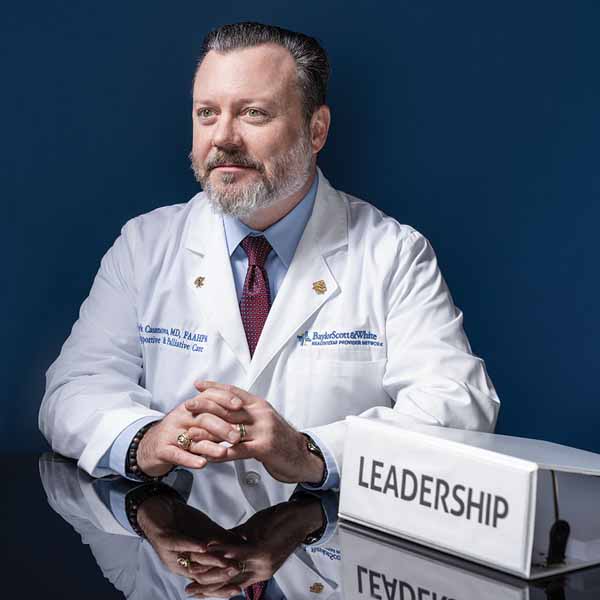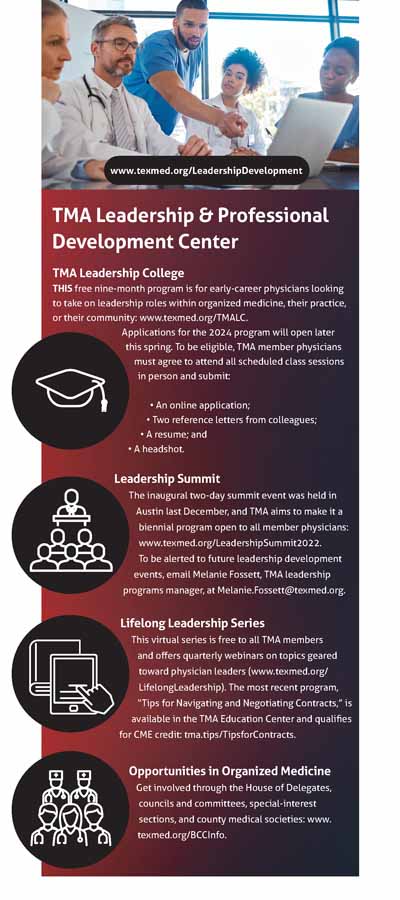
Dallas palliative care physician Mark Casanova, MD, traces his interest in organized medicine back to his early career.
Although he belonged to the Texas Medical Association as a medical student, he didn’t get involved until his second year in practice, when a colleague invited him to a Dallas County Medical Society (CMS) meeting.
There, he saw how organized medicine was working to solve the problems he and his patients experienced on the ground. Soon enough, he found himself at the Texas Capitol at 2 am, urging lawmakers to pass palliative care legislation.
It was his first introduction to the idea that “there’s more to medicine that’s meaningful and fulfilling and very important that can be balanced with the care that we provide at the bedside,” he told Texas Medicine.
Dr. Casanova was hooked, but he also wanted to develop the skills necessary to be an effective advocate.
So, in 2011, he enrolled in the TMA Leadership College’s second class. The free nine-month program prepares scholars for leadership positions at the county and state levels, closing the gap between physicians and health care policymakers.
Since then, he has held a series of leadership roles, and now serves as a member of TMA’s Council on Health Service Organizations; as an alternate in the Texas Delegation to the American Medical Association; and as district vice chair of TEXPAC, TMA’s political arm, along with various roles at Dallas CMS.
More recently, he has transitioned from a rising leader to something of a veteran, speaking at TMA’s inaugural Leadership Summit last December. The biennial event is for member physicians wanting to grow as leaders in their practices, communities, and organized medicine.
Melanie Fossett, TMA’s leadership programs manager, says the trainings work in tandem to serve TMA member physicians, whose medical education and training focus on clinical competency.
“It’s a very different skill set than diagnosing a patient,” she said of the curricula.
Dr. Casanova lauds both programs, which he says allow physicians to continue developing their leadership skills throughout their careers.
“Leadership … needs to be honed, needs to be exercised,” he said.
Back to college
Like Dr. Casanova, College Station urologist Alisa Berger, MD, jump-started her career in organized medicine by enrolling in TMA’s Leadership College.
Since 2010, the program has graduated more than 250 early-career physicians across a wide range of specialties and practice settings. It is application-based and open only to young physicians, defined as those within their first eight years of practice. It also requires a significant time commitment and travel to Austin and to TexMed, TMA’s annual conference, whose location varies.
When Dr. Berger became a scholar in 2013, she was ready to develop new skills, having “hung up her shingle” for solo practice six years earlier and found her footing as a business owner and physician.
The Leadership College delivered, with instruction consisting of lectures, interactive workshops, small-group discussions, assigned reading, and case presentations. Scholars also complete a personal leadership assessment prior to the first in-person session and complete an individual project.
After learning about TMA’s governance structure, Dr. Berger nominated herself to serve on the Board of Councilors, TMA’s ethical policymaking body. In the years since, she has risen to the rank of chair.
As she grew more experienced with organized medicine at the county and state levels, Dr. Berger also began working with the American Urological Society, advocating for policy changes at the U.S. Capitol.
“It definitely served its purpose and was a wonderful platform for me to jump off of,” she said of the Leadership College.
The program also fostered friendships – her classmate Vivek Rao, MD, an allergist in Odessa, is vice chair of the Board of the Councilors – and gave her the chance to grow and contribute beyond her small-town practice.
“It helps to keep my mind stimulated and active,” she said.

Reaching the summit
TMA’s Leadership Summit is less of a time commitment – the 2022 event spanned two days – and moving forward will be open to all members, including Leadership College alumni.
This makes it a good option for physicians like Umar Latif, MD, a psychiatrist in Frisco who has been practicing for 18 years. He recently became more involved with TMA after witnessing the association’s response during the early months of the COVID-19 pandemic.
“It was very impressive how TMA had a preexisting, established body of work that allowed [it] to be a thought leader and a resource for physicians and patients during COVID,” he said.
Dr. Latif was already passionate about “healing the healers.” He co-founded and serves as national medical director of Help for Heroes, a multisite behavioral health program for military personnel, veterans, first responders, and other high-risk frontline professionals.
Galvanized by the pandemic and TMA’s response, he began volunteering last year with Emotional PPE, Dallas CMS’ physician wellness program. But he quickly identified the need for upstream solutions, ones that would help protect physicians from the burnout and moral injury that led them to the program in the first place.
“Where TMA, especially with [its] long trajectory of advocacy and legislation, can play a role is in more proactive, preventive physician wellness advocacy and legislation,” he said.
Around the same time, Dr. Latif was nominated to attend TMA’s Leadership Summit through his work with Dallas CMS.
He says the experience left him feeling prepared to support his cause, with sessions ranging from media training and organizational strategic planning to personal goal-setting and how to navigate private equity mergers.
He also encourages his physician peers to join him by registering in 2024.
“We need to be an active part of our own destiny and physician advocacy,” he said. “Learning the skills and how to do it effectively is something [for which] TMA is creating the programs to deliver.”